Ogunda Dio (Ogunda Odi)

Ogunda Dio is Odu #140 in the Lordly Order of Ifa, in which the complex nature of failure and disappointment is revealed. From deception and mistrust to infidelity, this Ifá sign addresses life's challenges with depth.
Treaty of the Oddun of Ifa Ogunda Dio
What is born in the odu of Ifa Ogunda Dio?
- The fact that Ogue lives inside Shango's punt.
- The fear of humans to the darkness of the night.
- Here deception and lies were born, since always the person will be deceived or deceives his own family and all those who surround him and he surrounds.
- The distrust.
What is the sign Ogunda Dio talking about?
- Talk about lost illusions.
- It is an Ifá of failures.
- It was where Elegua went crying where Orunmila was because he couldn't find the way.
- This is an Ifá of lost illusions; Since the illusions that the person has during his life, he cannot achieve them and if he does it will be for a short time, because he loses it. This is in every sense of life. That is why it is an Ifá of failure.
The sign Ogunda Odi 3-7 points out:
- This Ifá indicates that the person should try to turn on the light when it gets dark, because the evil eguns come to torment him.
- This oddun "Ogunda Dio" also indicates infidelity in women.
- The man for this Ifá has to take care of his virility, since he tends to lose his virile potential.
- Ogunda Dio points out that the house should have two entrances, so that sometimes you enter from the front and others from behind or from the side.
Other names of the Oddun Ogunda Dio:
- Ogunda Odi.
- Ogunda Say.
Analysis and Reflection of the Ifa sign Ogunda Dio (Ogunda Odi)
Ogunda Dio is an Odu who warns us about the complexities of life, marked by deception, mistrust and failure, but also by the possibility of redemption and clarity. This analysis unravels how his teachings affect our finances, health, spirituality, and relationships, guiding us toward overcoming adversity and strengthening our character.
General Analysis
Ogunda Dio tells us about the inevitable presence of ups and downs in life. As Ogue lives inside Shango's punt, he symbolizes the coexistence of strength and vulnerability. The presence of deception and lies warns about the ease with which we can be diverted from our true path. The metaphor of Elebga putting on a mask to challenge the world reminds us that not all that glitters is gold, and that the true intention often lies hidden behind masks.
Economic Aspects
This Odu suggests caution in financial decisions, alluding to the importance of honesty and transparency to avoid "failure" in ventures. The reference to the lottery and the possibility of winning suggests that, although fortune may smile, it must be managed wisely to build or remodel a solid and safe home.
"Salud"
Health in Ogunda Dio is marked by the need for vigilance against hidden diseases, such as those suggested by references to surgery and the care of male virility. The recommendation to live high could be interpreted metaphorically as the need to aspire to a high state of well-being, both physical and spiritual.
Religious Aspects
Spirituality in Ogunda Dio emphasizes reconciliation with inner shadows. The procession inside the house to Obatala and the offering to Elegba on the seashore speak of purification and the search for clarity. This Odu urges us to face our fears and cleanse our spiritual environment to welcome the light.
Personal Relationships (Love)
In the area of love, Ogunda Dio warns against deception and infidelity, underlining the importance of consciously choosing a partner. The influence of a daughter of Oshun as a bringer of wealth and happiness highlights the need to respect and value the relationships that nourish our soul and contribute to our personal growth.
Ogunda Dio teaches us that behind every deception there is a lesson, and in every failure, an opportunity for rebirth. He reminds us of the importance of building a house (both literally and metaphorically) on a foundation of truth, respect, and spiritual clarity. In the darkness of the darkness of the night and in lost illusions, there is always a spark of light waiting to be ignited by those brave enough to face their shadows and transform them into paths of light and prosperity.
Explore the influence and teachings of Shango, the Orisha of thunder and justice, and its impact on spiritual life.
Recommendations of the Ogunda Dio Sign:
- Turn on the Light at Dusk: To dispel darkness and ward off evil eguns, it is recommended to illuminate the environment with physical and spiritual light.
- Keep the House Tidy and Clean: Physical cleanliness reflects and promotes clarity and order in the spiritual and emotional life.
- Respect and Honor the Daughters of Oshun: Your blessing can be key to prosperity and happiness.
- Perform Works with Obatala and Elegba: Especially when you are looking for a new home or want to improve your current one.
- Spiritual Protection: Reinforce personal and home security with symbolic objects such as mirrors and consecrated knives, and perform rituals to strengthen spiritual protection.
- Caring for Marital Relationships: Pay special attention to choosing a partner to avoid deception and infidelity.
Prohibitions:
- Avoid Deception and Lies: Since these behaviors tend to be a source of failure and disappointment.
- Do not sit on bottomless chairs: Metaphorically, this suggests avoiding situations or commitments where you do not have safe or reliable support.
- Beware of Infidelity: Both personally and for the couple, since it is indicated as a risk in this Odu.
- Avoid Spiritual Darkness: The light is both literal and figurative, indicating the need for clarity and truth in all actions.
- Don't Ignore the Signs of Elegua: Your discontent may be an indicator of internal problems or imbalances that need attention.
Sayings of the Sign of Ifa Ogunda Dio:
- Prepare rope for his neck.
- A project would have come to be true, if it were not for the cowardice that made her lips seal that she thought it.
- A knife destroys his house, and he thinks he has destroyed someone else's.
- Nothing tires if the desire is firm.
"Prepare a noose for his neck" warns us about the self-inflicted consequences of our actions. This saying highlights how impulsive or poorly considered decisions can lead us to situations for which we are solely responsible. It reminds us of the importance of reflection and prudence in every step we take, so as not to end up entangled in problems of our own making."A project would have become true, but for the cowardice that sealed the lips that thought it" reflects how the fear of failure or judgment can paralyze us, preventing our ideas and dreams from materializing. This saying highlights the value of courage to express our visions and pursue our goals, reminding us that the only real obstacle between us and success may be our own fear.
Together, these sayings teach us about self-responsibility and the courage needed to overcome inner fears. They urge us to act with awareness and boldness, reminding us that we are the architects of our destiny and that every choice carries the power to shape our future.
Ifa code of ethics of the odu Ogunda Di:
- The Awó does not sit in a bottomless chair.
Meaning of the Sign of Ifa Ogunda Dio:
The Ifá sign Ogunda Dio reveals deep practices and teachings for the Awó, underlining the importance of connection with nature and the Orishas to strengthen spiritual power and clarity in life. This Odu advises the Awó to immerse himself in rituals that purify and elevate, such as bathing with sacred herbs (ewé daguro) and enjoying the simple (tostón), symbolizing purification and enjoying the blessings of life.
The recommendation to live at heights, like the eagle, suggests an elevated and distanced perspective for a clear vision of reality, avoiding earthly distractions. Raising a chicken until it becomes a rooster involves the patience and observation necessary to identify the real enemies hidden in our environment.
Specific offerings to Shango and Elegba when this Odu appears, especially in initiation ceremonies, reinforce the connection with these powerful Orishas, promoting protection and prosperity. The mention that all eboses must include the head of a rooster highlights the value of life and sacrifice in religious practice.
For the Awó Ogunda Dio, it is crucial to maintain a respectful relationship with the daughters of Oshun, recognizing the feminine power and the influence of Oshun on abundance and luck. The lottery, as a metaphor, represents the unexpected opportunities for prosperity that can arise, urging preparation and cleansing as ways to attract good energy.
Prescribing acts of generosity, such as feeding one's door, symbolizes openness to receiving blessings and the importance of maintaining a welcoming and orderly home. For those under this sign who aspire to motherhood, the birth of a male child is predicted, symbolizing the continuation and renewal of life.
Finally, Ogunda Dio emphasizes the need to have one's own home, encouraging the performance of rituals with Obatala and Elegba to manifest this essential desire. This Odu teaches us about the balance between personal effort and spiritual guidance, preparation for prosperity and the importance of clarity and cleanliness in all aspects of life.
Says Ifa Ogunda Dio:
Ogunda Dio reveals that prosperity is just a step away from your home, urging you to fulfill its promises once fortune arrives. It is crucial to maintain humility and not despise others, as indifference could become his downfall. He remembers the moment when, standing on the bank of the river, he requested a favor from Oshun, who kindly granted his request. The possibility of winning the lottery looms in his path, a reflection of Oshun's divine favor.
You are warned about people who will approach you with bad intentions; Avoid collaborating in harmful actions, as this could backfire on you. On his way, he will come across a woman who, carrying a basket, symbolizes the presence of Oshun. By helping her, he will attract an unexpected blessing into her life. The arrival of night should be a reminder to illuminate your home, creating a welcoming space for light and clarity.
Hospitality will be a virtue when three visitors seek refuge in your home. Keep your space clean and welcoming, as this will make it easier to achieve your desires. However, fidelity within your marriage is essential; disloyalty could trigger unfavorable consequences.
The loss of something valuable is anticipated and will cause sadness, a reminder of the ephemerality of material possessions. The presence of a crowing rooster in your home symbolizes vigilance and new hope. He be cautious when interacting with others, especially those he shelters, and observe the actions of his neighborhood; Often those who seem less enlightened can be the bearers of great blessings.
Finally, if there is someone in your environment in the process of creating or starting something new, advise them to do Ebbo. An auspicious event involving a lottery ticket looms on your horizon, potentially leading to a significant win. This stream of events and advice underscores the importance of wisdom, generosity, and clarity on the path to personal and spiritual fulfillment.
Discover the fundamental role of Elegua, the Orisha of crossroads and paths, in Yoruba cosmology, and how its energy guides and protects those who honor it.
Prayer of the sign Ogunda Dio Ifa:
OGUNDA DIO OGUNDA ABATAMBA DADI ADALARA ADIFAFUN AIYE NABI EYELE IBA ERE EWEFA AKUKO
ELEBO OGUNDA DIO IBA NIRE GUNDI KAFEREFUN OBATALA ATI YEMAYA ADIFAFUN ELEGBA.
Suyere (chant) of the Oddun Ogunda Say:
ELEGBA BARA NI LALA, AWO IRA LELE IKU
ELEGBA BARA NI LALA, AWO IRA LELE IKU
ELEGBA BARA NI LALA, AWO AGBORAN EGUN IKU.
Ebbo (rituals) of Odu Ogunda Say:
Ebbo for Stomach Problems
Preparation of Omiero: To address digestive disorders, an ebbo is recommended, which consists of creating an omiero with ewé orozus. This preparation is placed in the Oshun tureen and, after seven days, it is bottled and refrigerated. Taking a cup of this omiero on an empty stomach promises relief and well-being.
Tribute to Orunmila
Carved Akukó for Orunmila: In honor of Orunmila, an akukó carved in wood is offered to him, enriched with spiritual elements such as the head and eyes of an akukó dedicated to Elegba, as well as other sacred ingredients. This tribute strengthens the connection with Orunmila, attracting protection and guidance from her.
Work for Money Evolution
Offering to Elegba and Shango: To promote financial prosperity, a ritual is carried out that includes offering Elegua and Shango four painted doves, previously prepared with a special omiero. This ritual symbolizes the elimination of negativities and the invitation to wealth. After applying epó and efún to the birds, their final destination is consulted, seeking to maximize the positive flow of energy and resources towards the practitioner.
Pataki of Ogunda Dio: The Separation of Orunmila and Dadi
In a remote time, Orunmila, endowed with infinite wisdom and direct communication with the Ifá oracles, had Ogun and Elegba as messengers. Orunmila was united in marriage with Dadi, a relationship marked by trust and mutual respect. One day, Orunmila entrusted Ogun and Dadi with the mission of recovering a valuable object that he had forgotten in a friend's home, located fifteen days away in the country of Ayo.
Orunmila, possessor of a magic mirror that allowed him to observe from a distance, watched over the journey of his messengers night after night, ensuring their well-being and correct conduct. For fifteen days, he saw with satisfaction how they progressed without setbacks and fulfilled the assigned task.
However, on the last night of the return, just one day away from the reunion, orunmila He observed through his mirror a scene that broke his heart: Ogun and Dadi lay together, embraced in an intimate betrayal. Disappointment and pain invaded Orunmila, who had placed her complete trust in his messenger and her wife.
When Ogun and Dadi arrived, Ogun was received with words that hid Orunmila's internal storm: he recognized Ogun's effort as a messenger, but could not hide his disappointment at the final betrayal. After receiving the lost object, Orunmila declared the end of her union with Dadi, marking the final separation and leaving Ogun and Dadi to embark on a new path together, far from him.
Moral: This pataki teaches about the importance of trust and loyalty in all our relationships, as well as the consequences of our actions. Although the road may be long and full of trials, it is in the final moments where our true nature is revealed. Likewise, he reminds us that wisdom and foresight can help us face adversity, but forgiveness and release from that which harms us are crucial to continuing our own spiritual path.
You can read: Ifa sign Odi Ogunda
Ogunda Dio - Traditional Nigerian Ifa.
ÒGUNDÁ ÒDÍ
Ó seun seun lalo
Ó sèèyàn sèèyàn lábò
A day fún Òrúnmìlà
You tí n soko Àdí
Tí Ògún n soko Epo
Nígbà ti Ògún n re ibi àtòkè dokè
Wón yes móo gba Obìnrin òrée won lówó
Bí ààyé bá Síílè fún un
Ògún bá wá gba Obìnrin Òrúnmìlà
Pé kó tèlé òun lo si òkèèrè
Ó féé mú Àdí lo
Ògún bá mú Àdí lówó lo
Tí ón yes fi gbé gbogbo osù tí ón gbé lóhùún
Kò yes I laso wò rí
Sùgbón ngbà tí wonó móo bò
Tó ku ibùsò diè kí won or dé ilé
Ilè su won
ni on bá sun
Oorun pa won pò
Obìnrin bán jaarunpá lu Ògún
Òrúnmìlà ti rí gbogbo è nlé
Torí àwòyeróye Awo Ilé Òrúnmìlà
Òun ti na Ìbon yes on
You you n woyee won
Ògún Sá se bí eré
Kò lè mú u móra mó
Bí Obiin tí n seé yes Ògún
Ògún ò sì ti yà si I télè
Ògún bá a sùn
Ngbà tí on dé ilé
Ìtira ò jé or lè de odo Òrúnmìlà mó
Obìin bá padà délé
'Ògún dà'?
Ó ní n bò
Òrúnmìlà ni bíi báwo?
'Ta n mú o lo'?
'Fixed tea lo ìrìn àjò'
'Kò wáá níí wá mó ni'?
Okán Ògún yes n me
Ngbà or said kan
Òrúnmìlà bá pàdé Ògún lésè ò gbèjì
O Niwo Ogun
'Ó sì seun seun lalo'
'Ó sèèyàn sèèyàn lábò'
'Ó kààbò rébété'
'Ó wáá ba ìyókù jé'
Òrúnmìlà ló dáa
'I know or do Àdí ni'
'Móo gba Àdí'
'Bóun mú Epo'
Òrúnmìlà bá gba Epo
Ògún bá mú Àdí
Láti ijo náà ló ti di pé Ògún àti àdí
Àwon méjèèjì ni won jó n sùn won jo n jí
Ó seun seun lalo
Ó sèèyàn sèèyàn lábò
Ó kù rébété lo wá bàyókù jé
A day fún Ògún
Èyí tí n lo rèé do Àdí
Ògún or do Àdí
Or gba Àdí
Ifá waá gba Epo lówóo re
Ògún lo did Àdí
Nifá fi gba Epo lówóo re.
Ifá advises this person to exercise restraint in matters with women, especially with the wife of his intimate ally, so that the woman does not create enmity between them. This person must be faithful to this friend, because if not, an affair between him and the friend's wife can lead to a chain of bad things.
He did very well on his journey
He was very human when he returned from his day
He made divination for Òrúnmìlà
That he had ever been Àdí's husband
And Ògún who had once been Epo's husband
Ògún went to a destination that transcends the hills on one occasion
Many years ago, one could take a friend's wife
If there was a possibility on her part
As a consequence Ògún came for Òrúnmìlà's wife
To accompany him abroad on his journey
He wanted to travel with Àdí
So Ògún decided to take Àdí
For months they stayed in a foreign city
Ògún never intended to be with her intimately
But when they were coming back
Only about two miles from home
It was getting dark
They slept on the road
They slept together
The woman lay down in a very seductive way
So Orúnmìlà had seen everything from home
Because of the magic exposure
He saw through his Òsùn
Is looking at the whole scene
Ògún, without exercising self-control,
Could not contain the invitation
The woman's actions were too obvious
So far Ògún had never touched her
All at once, Ògún had sex with her
When they came home
He was careful due to his act of treachery; I couldn't go to Orúnmìlà's house
When Àdí arrived at casarúnmìlà's house
Únrúnmìlà asked: 'Where is Ògún'?
The woman lied telling him: 'He will come later',
'Why did he do that'? replied to Òrúnmìlà
Òrúnmìlà counterattacked saying: 'Who ran it'?
'What did you do with him on the trip'?
Orúnmìlà, surprised, wondered 'He won't show his appreciation'?
However, Ògún was afraid to visit Òrúnmìlà
But on a fatal day
Òrúnmìlà met Ògún on the way
He accused him by saying: 'You Ògún',
'You did very well on your trip'
'You were very human on your return trip'
'If I had been persistent'
'But it spoiled everything'
Únrúnmìlà continued 'That's fine',
'Now that you've had sex with Àdí'
'You can now have it permanently'
'But you will have to change it and give me Epo'
Òrúnmìlà took Epo instead
Ògún took Àdí
Since then, Ògún and Àdí became one
They slept and woke up together
He did very well on his journey
He was very human to return from his journey
Just have a little perseverance
He made divination for Ògún
The one who was going to have sex with Àdí
Ògún, you were having sex with Àdí
You grabbed Àdí
Instead Òrúnmìlà took Epo from you
It was Ògún who had sex with Àdí
And Ifá took Epo from him.
Eshu Ariwo of Ogunda Di (3-7): The Manifestation of the Guardian
This unique Eshu, known as Eshu Ariwo, lives in a figure meticulously carved from male jagüey wood. Its essence is activated by inserting a sacred charge into its head, composed of elements that link the spiritual realm with the earthly one.
Holy Burden: Includes the essence of Adam, cat's eyes, parts of mouse, fish, rooster, and seven types of lands selected after consultation, along with eru, obi, kolá, osun, aira, and other powerful ingredients including sacred herbs, precious metals and protective elements, creating an unbreakable bond with the cosmos.
Once prepared, the doll is placed inside a deep clay pot, marked with essential Ifá signs: Oshe Tura, Ogunda Di, Otura She and Okana Sa, symbolizing a balance of energies. This container is buried at the foot of a jagüey, in a ritual of rebirth and hidden power.
After twenty-one days of underground connection, the casserole is unearthed and broken at the entrance to the cemetery, completing its transformation with an offering of rooster and essential foods, sealing the pact with the earth.
Eshu Ariwo, now revived and strengthened, is cleansed with awade and croto leaves, offered hutía in sacrifice and adorned with a sash of seven snails, symbolizing his connection with the spiritual world and his role as the resonant guardian of the paths . Dressed as a mariwó, Eshu Ariwo becomes the ambassador of noise, carrying the voice of the ancestors and the secrets of the afterlife.
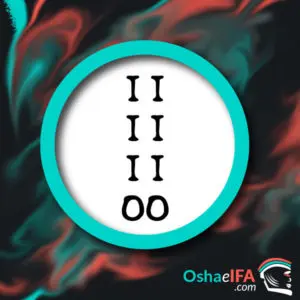


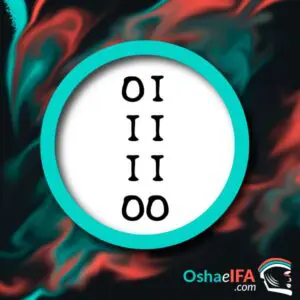
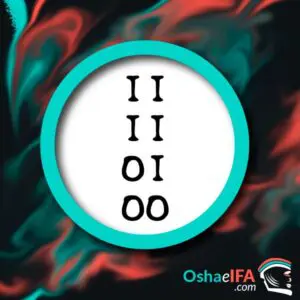
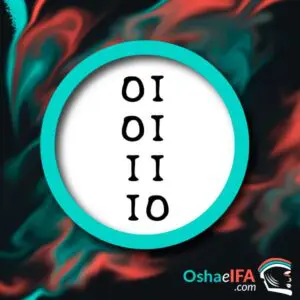


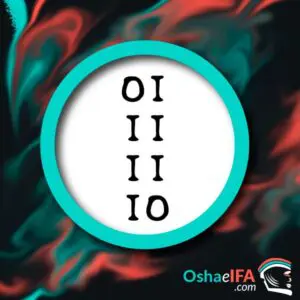
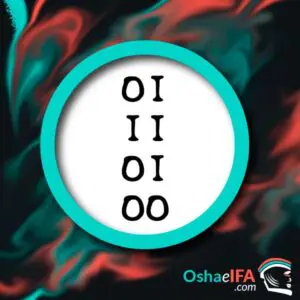
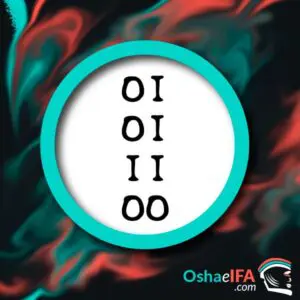


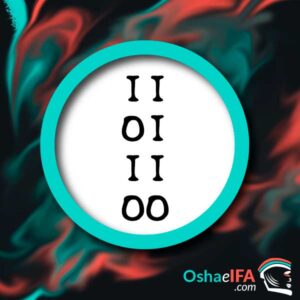
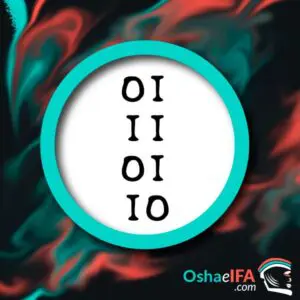
IBORU IBOYA IBO SHISHE
Aboru boye Nile IFA o, amaa juse